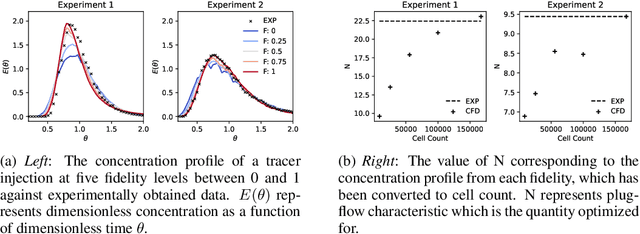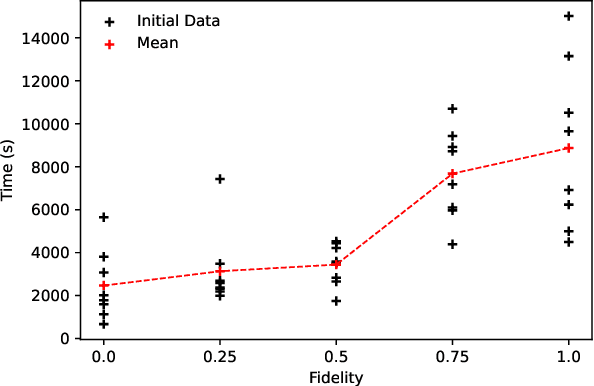Tom Savage
Human-Algorithm Collaborative Bayesian Optimization for Engineering Systems
Apr 16, 2024Abstract:Bayesian optimization has been successfully applied throughout Chemical Engineering for the optimization of functions that are expensive-to-evaluate, or where gradients are not easily obtainable. However, domain experts often possess valuable physical insights that are overlooked in fully automated decision-making approaches, necessitating the inclusion of human input. In this article we re-introduce the human back into the data-driven decision making loop by outlining an approach for collaborative Bayesian optimization. Our methodology exploits the hypothesis that humans are more efficient at making discrete choices rather than continuous ones and enables experts to influence critical early decisions. We apply high-throughput (batch) Bayesian optimization alongside discrete decision theory to enable domain experts to influence the selection of experiments. At every iteration we apply a multi-objective approach that results in a set of alternate solutions that have both high utility and are reasonably distinct. The expert then selects the desired solution for evaluation from this set, allowing for the inclusion of expert knowledge and improving accountability, whilst maintaining the advantages of Bayesian optimization. We demonstrate our approach across a number of applied and numerical case studies including bioprocess optimization and reactor geometry design, demonstrating that even in the case of an uninformed practitioner our algorithm recovers the regret of standard Bayesian optimization. Through the inclusion of continuous expert opinion, our approach enables faster convergence, and improved accountability for Bayesian optimization in engineering systems.
Expert-guided Bayesian Optimisation for Human-in-the-loop Experimental Design of Known Systems
Dec 05, 2023Abstract:Domain experts often possess valuable physical insights that are overlooked in fully automated decision-making processes such as Bayesian optimisation. In this article we apply high-throughput (batch) Bayesian optimisation alongside anthropological decision theory to enable domain experts to influence the selection of optimal experiments. Our methodology exploits the hypothesis that humans are better at making discrete choices than continuous ones and enables experts to influence critical early decisions. At each iteration we solve an augmented multi-objective optimisation problem across a number of alternate solutions, maximising both the sum of their utility function values and the determinant of their covariance matrix, equivalent to their total variability. By taking the solution at the knee point of the Pareto front, we return a set of alternate solutions at each iteration that have both high utility values and are reasonably distinct, from which the expert selects one for evaluation. We demonstrate that even in the case of an uninformed practitioner, our algorithm recovers the regret of standard Bayesian optimisation.
Machine Learning-Assisted Discovery of Novel Reactor Designs via CFD-Coupled Multi-fidelity Bayesian Optimisation
Aug 17, 2023Abstract:Additive manufacturing has enabled the production of more advanced reactor geometries, resulting in the potential for significantly larger and more complex design spaces. Identifying and optimising promising configurations within broader design spaces presents a significant challenge for existing human-centric design approaches. As such, existing parameterisations of coiled-tube reactor geometries are low-dimensional with expensive optimisation limiting more complex solutions. Given algorithmic improvements and the onset of additive manufacturing, we propose two novel coiled-tube parameterisations enabling the variation of cross-section and coil path, resulting in a series of high dimensional, complex optimisation problems. To ensure tractable, non-local optimisation where gradients are not available, we apply multi-fidelity Bayesian optimisation. Our approach characterises multiple continuous fidelities and is coupled with parameterised meshing and simulation, enabling lower quality, but faster simulations to be exploited throughout optimisation. Through maximising the plug-flow performance, we identify key characteristics of optimal reactor designs, and extrapolate these to produce two novel geometries that we 3D print and experimentally validate. By demonstrating the design, optimisation, and manufacture of highly parameterised reactors, we seek to establish a framework for the next-generation of reactors, demonstrating that intelligent design coupled with new manufacturing processes can significantly improve the performance and sustainability of future chemical processes.
Deep Gaussian Process-based Multi-fidelity Bayesian Optimization for Simulated Chemical Reactors
Oct 31, 2022



Abstract:New manufacturing techniques such as 3D printing have recently enabled the creation of previously infeasible chemical reactor designs. Optimizing the geometry of the next generation of chemical reactors is important to understand the underlying physics and to ensure reactor feasibility in the real world. This optimization problem is computationally expensive, nonlinear, and derivative-free making it challenging to solve. In this work, we apply deep Gaussian processes (DGPs) to model multi-fidelity coiled-tube reactor simulations in a Bayesian optimization setting. By applying a multi-fidelity Bayesian optimization method, the search space of reactor geometries is explored through an amalgam of different fidelity simulations which are chosen based on prediction uncertainty and simulation cost, maximizing the use of computational budget. The use of DGPs provides an end-to-end model for five discrete mesh fidelities, enabling less computational effort to gain good solutions during optimization. The accuracy of simulations for these five fidelities is determined against experimental data obtained from a 3D printed reactor configuration, providing insights into appropriate hyper-parameters. We hope this work provides interesting insight into the practical use of DGP-based multi-fidelity Bayesian optimization for engineering discovery.
 Add to Chrome
Add to Chrome Add to Firefox
Add to Firefox Add to Edge
Add to Edge